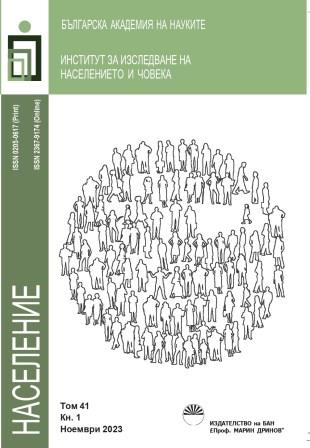Съвременни аспекти на влиянието на жизнения стандарт върху раждаемостта в България
Influence of the standard of living on the birth rate in Bulgaria
Author(s): Nikolay StoenchevSubject(s): Social Sciences, Sociology, Health and medicine and law, Family and social welfare, Policy, planning, forecast and speculation, Demography and human biology, Economic development
Published by: Институт за изследване на населението и човека - Българска академия на науките
Keywords: birth rate; fertility; standard of living; complex criteria.
Summary/Abstract: The article presents the results of a statistical analysis of the dependence of the birth rate in Bulgaria on the standard of living in an up-to-date aspect. Fertility was presented using the gross birth rate and the total fertility rate. In order to assess the standard of living, a complex set of criteria for administrative areas was calculated, taking into account the state of 12 specially selected indicators at the same time. The information used was: the information officially published by the National Statistical Institute, Eurostat and data from the publication “Regional Profiles – Development Indicators” by the Institute for Market Economy. The algorithm of the used methodology was detailed, including the user options and arguments for choice. An international comparison was also made involving the EU Member States. The lack of a significant relationship between the birth rate and the standard of living according to complex criteria in Bulgaria and a moderate negative relationship between the total fertility rate and the standard of living in our country was revealed. When the analysis is based only on the GDP per capita as criteria for the achieved standard of living, the relationship between material well-being and the birth rate turns out to be moderately positive, both for Bulgaria and for the entire set of EU Member States (EU 27). Recommendations were made for selective material stimulation of the population in reproductive age and special attention to support married couples with reproductive problems and vulnerable social communities.
Journal: Население
- Issue Year: 41/2023
- Issue No: 1
- Page Range: 39-66
- Page Count: 28
- Language: Bulgarian
- Content File-PDF

